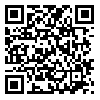Volume 2, Issue 3 (Summer 2014-- 2014)
PCP 2014, 2(3): 181-194 |
Back to browse issues page
Ali Mehrabi1 
 , Parvaneh Mohammadkhani *
, Parvaneh Mohammadkhani * 
 2, Behrooz Dolatshahi1
2, Behrooz Dolatshahi1 
 , Abbas Pourshahbaz1
, Abbas Pourshahbaz1 
 , Abolfazl Mohammadi3
, Abolfazl Mohammadi3 


 , Parvaneh Mohammadkhani *
, Parvaneh Mohammadkhani * 
 2, Behrooz Dolatshahi1
2, Behrooz Dolatshahi1 
 , Abbas Pourshahbaz1
, Abbas Pourshahbaz1 
 , Abolfazl Mohammadi3
, Abolfazl Mohammadi3 

1- Department of Clinical Psychology, University of Social Welfare and Rehabilitation Sciences, Tehran, Iran
2- Department of Clinical Psychology, University of Social Welfare and Rehabilitation Sciences, Tehran, Iran. , parmohamir@yahoo.com
3- Department of Psychiatry, Tehran University of Medical Sciences, Tehran, Iran
2- Department of Clinical Psychology, University of Social Welfare and Rehabilitation Sciences, Tehran, Iran. , parmohamir@yahoo.com
3- Department of Psychiatry, Tehran University of Medical Sciences, Tehran, Iran
Abstract: (5190 Views)
Objective: In recent years, there has been a rising interest in cognitive behavioral research to explore the role of emotion regulation in the development and maintenance of mental disorders and resiliency against or recovery from them. Particularly, different strategies people use to regulate their emotions may have more important role in emotional disorders including depression. The aim of this article is to review the recent literature focusing on the role of ER in depression.
Methods: In this paper, we present a brief review of the latest studies (in English and Persian) regarding depression and 6 relevant emotion-regulation strategies (i.e. suppression, rumination, experiential avoidance, reappraisal, mindfulness, and acceptance). Then, we attempt to integrate findings of these cognitive-behavioral and neurobiological investigations utilizing the Gross`s process model of emotion regulation.
Results: According to the research results, we can generally conclude that emotion regulation may be an important mediator/moderator mechanism in the pathogenesis of depression that could also be a good target for intervention in psychotherapy.
Conclusion: Some challenging issues in this area are noted and their implications for cognitivebehavioral research and therapies are discussed.
Keywords: Depression, Emotion regulation, Suppression, Reappraisal, Rumination, Mindfulness, Experiential avoidance, Emotional acceptance
Type of Study: Research |
Subject:
Cognitive behavioral
Received: 2014/08/16 | Accepted: 2014/10/19 | Published: 2015/03/5
Received: 2014/08/16 | Accepted: 2014/10/19 | Published: 2015/03/5
| Rights and permissions | |
 |
This work is licensed under a Creative Commons Attribution-NonCommercial 4.0 International License. |
